Extensive Unemployment in the Pandemic: Future Anxiety of LGBTI+ People in the Public and Private Sector
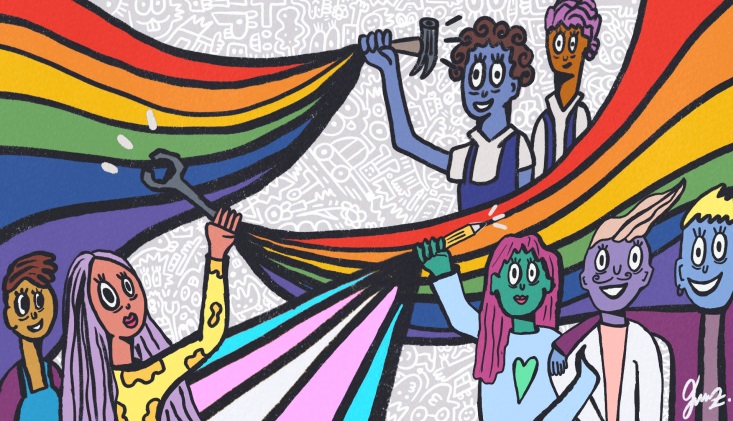
According to the ‘Situation of Lesbian, Gay, Bisexual, Trans, Intersex and Plus Employees in Public Sector in Turkey’ report, LGBTI+ people are among the disadvantaged groups most affected by the unemployment crisis that peaked with the pandemic. LGBTI+ people who work with the fear of being fired because of their sexual identity are worried about their future because they are exposed to discrimination and hate speech in the workplace.
Kaos GL Association shared the 2021 results of the reports titled ‘Situation of Lesbian, Gay, Bisexual, Trans, Intersex and Plus Employees in Public Sector in Turkey’ and ‘Situation of Lesbian, Gay, Bisexual, Trans, Intersex and Plus Employees in Private Sector in Turkey’.
2021 report was prepared by Prof. Dr. Mary Lou O’Neil, Dr. Reyda Ergun, Dr. Selma Değirmenci, Dr. Kıvılcım Turanlı and Doğancan Erkengel. Murat Köylü and Defne Güzel from Kaos GL Human Rights Program were its editors.
We talked to Kaos GL Human Rights Program Coordinator Murat Köylü, who is the editor of the report, about the outputs of the report.
Stating that they carried out this research on LGBTI+ people to voice their human rights issues, Köylü said, ‘Whatever a person is affected by in the field of employment, LGBTI+ people are also exposed to more pressure as a reflection of the hate speech. With this report, we tried to create a space for them to express their difficulties. In the report, we have given a lot of space to the statements of LGBTI+ people.’
‘I Want to Live Without Fear of Being Fired’
According to the report, the discrimination faced by LGBTI+ people in employment reflects the situations that hinder all fundamental rights and freedoms as well as the right to work. For example, the sentences of a gay man who works as a cook in the food industry are as follows: ‘In the workplaces, people like us should not be treated like freaks, and they should ensure that we have the same rights and equality as everyone else. I want to live comfortably, without being harassed, without fear of being beaten, killed or fired.’
‘LGBTI+ People are Systematically Discriminated in Business Life’
Considering the reports of previous years on how LGBTI+ people were affected by the pandemic process, Köylü made the following assessments:
‘Like other vulnerable and disadvantaged groups, LGBTI+ people were also affected by the pandemic. There was the same inequality in matters such as the delivery of pandemic aid. According to the research, the future anxiety of a significant part of LGBTI+ people, who have difficulties in finding a job during the pandemic, has deepened. People who have to constantly struggle with the problem of unemployment reveal that this situation affects LGBTI+ people more negatively.
Working LGBTI+ people are a group that is systematically discriminated against in business life. There are problems encountered directly or indirectly, consciously, or unconsciously. In this research we do every year, the data repeats itself. They are exposed to discrimination in the workplace, their promotion is blocked, they are exposed to hate speech, they are insulted, and they can be abused by various social norms in the recruitment process.’
‘There Are People Who Have to Close Their Businesses’
When it comes to LGBTI+ people, even the direction of mobbing is changing. Mobbing is generally applied from top to bottom by bosses or managers. However, in this situation, they are, humiliated and stigmatized when they are an employer or manager who is suspected of being ‘gay’. There are people who have had to close their business.
‘They Avoid Looking for a Job Through İŞKUR’
LGBTI+ people, who face all kinds of problems while looking for a job, avoid looking for a job through the government agency İŞKUR or private employment agencies, as they are exposed to all kinds of discrimination by the government. Because they have no trust. This situation, which is very low in 2021, as it is every year, points out that LGBTI+ employees do not trust these channels and are suspicious of the risk of being ‘flagged’. In addition, the research also reveals that LGBTI+ people with unemployment problems generally have high unemployment rates, although they have graduate and postgraduate education.
‘The Directorate of Religious Affairs’ Mind-blowing LGBTI+ Statement’
Emphasizing that two phenomena drew their attention in the 2021 report compared to other years, Kaos GL Human Rights Program Coordinator Murat Köylü continued:
‘First, the government is not in line with international human rights commitments for LGBTI+ people. It has an approach that fuels hatred and almost accuses people of being terrorists. Many participants shared that this approach fueled the current negative environment in the workplace. The second fact is the disastrous LGBTI+ statement by the Directorate of Religious Affairs. The Directorate made a statement that pandemics were caused by LGBTI+ people and people living out of wedlock, and then many government officials made statements supporting the Directorate. On the one hand, LGBTI+ people have to live with the fear of pandemics, on the other hand, they were shown as the cause of the pandemic.’
‘They Prefer Working from Home to Avoid Discrimination’
Participants said that the pandemic process has both positive and negative aspects. There are business life norms such as more space is reserved for married people, their appointments are made easier, and single people are more suitable for overtime if overtime is to be had. LGBTI+ people cannot get married because their rights are legally violated. For this reason, they could not benefit from the official and unofficial rights that come with marriage.
On the other hand, a positive situation emerged due to negativity in the report. The situation in some people’s workplaces is so bad that working from home and not going to work during the pandemic period was stated as a positive situation. They stated that they feel safer when they are physically away from the male-dominated work environment, as a drowning man will grab at a straw. They prefer to work from home rather than face bad jokes and innuendo.
‘We Will Announce a New Text on Human Rights Day’
Stating that they are working on this report not only to reveal the problems, but also to offer solutions to these problems, Köylü said, ‘With this research, we make suggestions to both the private sector and the public administration. We have established these recommendations on the basis of knowledge. On December 10, Human Rights Day, we have prepared and announced a text for companies, based on both the law and our research results. Our aim is to be a solution partner, to facilitate human life and to serve social peace.’
Solution Suggestions for Combating Discrimination
Köylü conveyed the outputs of the report on what kind of suggestions can be made for employers and businesses to prevent LGBTI+ people from being exposed to discrimination and hate speech in the public and private sectors:
‘There are examples of good work for both public and private sector employees in countries that were in a much worse situation than Turkey thirty or forty years ago. If countries like England, Iceland and Sweden have succeeded, why can’t we?
From this point of view, structural measures should be taken since there is a systematic discrimination. The Labor Law, legislation that prevents hate crimes and ensures equality must be put into error. We may prohibit grounds of discrimination in national legislation. In particular, decisions should be made in line with the decisions of the ECHR (European Court of Human Rights) and the equality principle of our Constitution.’
‘We Have Come to The Point Of “I Have No Expectations, Just Leave Me Alone”’
Pointing out that the government’s message will affect public employees, Köylü said, ‘On the private sector side, employers and institutions should investigate the problems and produce solutions at both macro and micro levels. Being “homophobic” and “transphobic” is just as bad as racism and sexism. In order to be able to do these, establishing a dialogue environment can be a step to take action.
While the state has already taken these steps among its duties, those who speak on behalf of the state are trying to impose a situation like a pandemic on LGBTI+ people. That being the case, we’ve almost come to the point of I have no expectations, just leave me alone” mindset.
LGBTI+ people are disempowered and deprived of their rights, but instead of looking at them as “victims” or people in distress, on the contrary, you give the greatest support by being sensitive as “This is my problem too”. It will also be invaluable to support policy and lawmakers in making remedial decisions as citizens.’
Important Outputs from the ‘Situation of Lesbian, Gay, Bisexual, Trans, Intersex and Plus Employees in Private Sector in Turkey’ Report
– According to the results of the study ‘Situation of Lesbian, Gay, Bisexual, Trans, Intersex and Plus Employees in Private Sector in Turkey’, in which 633 people participated, only 17 percent of LGBTI+ employees can be open at work.

[Table: What is your educational status?
The answers from left to right: Elementary, middle, high school, associate, graduate, postgraduate, none.]
– 309 of the 3 participants (48.8%) declared that they had a bachelor’s degree. The number of participants stating their educational status as postgraduate is 139 (22.0%), the number of participants stating as high school is 100 (15.8%) and the number of participants stating as associate degree is 77.
– Only 10 percent of LGBTI+ employees are open during the recruitment process. Fear of discrimination and rejection of the application force them to hide their gender identity, sexual orientation, and gender characteristics.

[Table: Are you open about your gender identity/sexual orientation/intersex status in the institution you work for?
The answers from left to right: Yes, I’m fully open. / I am partly open. / I am not open, but I think it’s guessed. / No, I’m not open at all. / Other (please specify)]
– Most workplaces have rules and practices that lead to discrimination. LGBTI+ employees cannot seek their rights due to fear of losing their job in the face of discrimination, the possibility of paying higher prices, fearing the disclosure of their sexual identity beyond their control, difficulties they may encounter in their life outside of work and similar reasons.
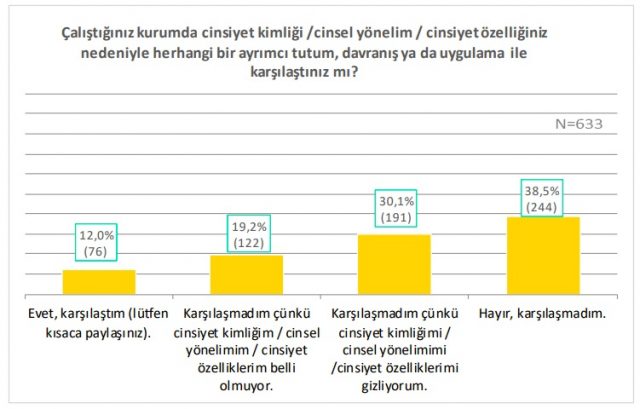
[Table: Have you encountered any discriminatory attitudes, behaviors, or practices due to your gender identity/sexual orientation/gender characteristics in the institution you work for?
The answers from left to right: Yes, I have (please share briefly). / I have not because my gender identity/sexual orientation/gender characteristics are not clear. / I have not because I hide my gender identity/sexual orientation/gender characteristics. / No, I haven’t.]
– LGBTI+ people working in the private sector demand for non-discrimination in national legislation, for the government to assume leadership with responsibility, and for public awareness campaigns.
Important Outputs from the ‘Situation of Lesbian, Gay, Bisexual, Trans, Intersex and Plus Employees in Public Sector in Turkey’ Report

[Table: Are you open about your gender identity/sexual orientation/intersex status in the institution you work for?
The answers from left to right: Yes, I’m fully open. / I am partly open. / I am not open, but I think it’s guessed. / No, I’m not open at all. / Other (please specify)]
– The results of the public survey, in which 221 people participated, show that having to hide in the workplace has more serious consequences for the public. While only 6 percent of LGBTI+ public servants can act openly at work, the report emphasizes that not being open at work is also a form of discrimination.
– According to the report, 82 percent of LGBTI+ public servants either face direct discrimination or are discriminated against by having to hide their identity.
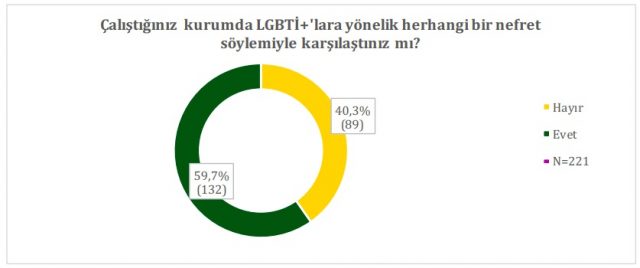
[Table: Have you encountered any hate speech towards LGBTI+ people in your institution?
The answers: Yes (132 people, 59.7%) and No (89 people, 40.3%)]
– Within the scope of the survey, in response to the question ‘Have you encountered any hate speech towards LGBTI+ people in your institution?’, 40 percent of the participants stated that they had not encountered any hate speech, while 60 percent stated that they were exposed to hate speech.
– The participants were asked, ‘What do you think are the three top priority measures that should be taken against discrimination against LGBTI+ employees in public institutions?’. In response to the question, the category of ‘legal measures’ that should be taken regarding LGBTI+ rights came to the fore. Demands for updating the legislation according to universal human rights criteria were followed by demands for ‘government to assume responsibility and leadership’ and ‘prohibition of discrimination in internal legislation’, respectively.
DRAWINGS: Gülçe-Gülnaz | KaosGL.org

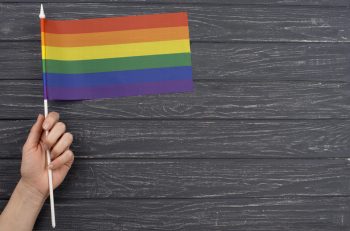







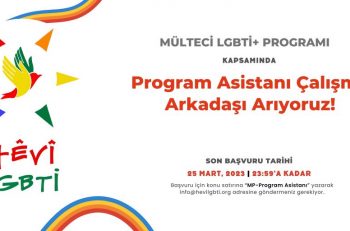
Bizi Takip Edin